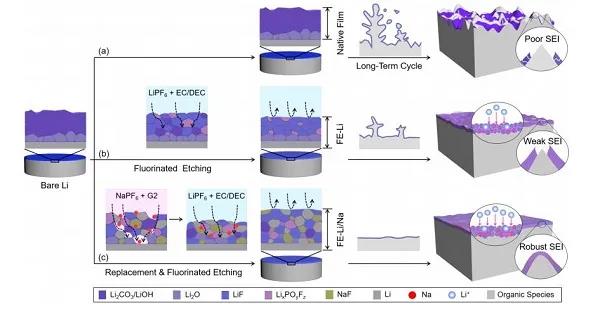Metallic lithium is one of the most tempting anode candidates for building next-generation high-energy-density rechargeable batteries because of its ultrahigh specific capacity and low redox potential. However, the intrinsic issue is the unstable solid electrolyte interphase (SEI) that induces the heterogeneous ionic diffusion and deposition of Li, ultimately causing uncontrolled dendrite growth. Propagation of dendrites and repeating breakup and reformation of SEI lead to the loss of active Li and performance degradation. A variety of strategies are designed to address the issues, substantial progress in homogenizing the nucleation and growth of Li has been made, while facile, efficient routes for the dendrite problems remains challenging.

Early studies demonstrate that the properties of SEI are closely related to the surface state of Li metal in aprotic electrolytes. A key to circumventing dendrite growth is to construct a robust SEI. LiF in SEI suppresses dendritic Li growth because it prevents prolific electrolyte decomposition and induces the lateral dispersion of Li. Analogously, the electrically insulating NaF could inhibit the formation of Na dendrites. It is thus anticipated that an SEI with hybrid LiF and NaF would contribute to upgrading the Li anode for LMBs.
In February, Prof. Fangyi Cheng reported a fluorinated hybrid SEI on Journal of the American Chemical Society (Electroless Formation of a Fluorinated Li/Na Hybrid Interphase for Robust Lithium Anodes, DOI: 10.1021/jacs.0c12051). The work introduces a fluorinated lithium/sodium hybrid interphase via a facile electroless electrolyte-soaking approach, and investigates its texture, composition, and interface properties by DFT calculations and experimental studies. Furthermore, the electrochemical performances of the fluorinated hybrid SEI-modified Li anodes are evaluated in symmetric cells and full cells coupled with LiFePO4 cathodes.
The hybrid SEI consists of enriched inorganic and organic ingredients, presenting favorable mechanical rigidity to prevent Li dendrite growth while the organic components could well accommodate the electrode volume variation. In addition, the Li/Na hybrid SEI features a high ionic conductivity and a high interface energy toward Li, which together facilitate the fast lateral transport of Li+ on the interface and lead to more uniform Li nucleation with fast kinetics. Thus, the FE-Li/Na anode enables superior Li plating/stripping performance in symmetric cells that sustain long-term cycling of more than 1300 h at a high areal capacity of 10 mAh cm–2 as well as in Li|LiFePO4 full cells that afford a high capacity retention of 96.70% after 200 cycles. This work provides a promising strategy for the rational design of stable interfaces on Li metal anodes and opens an alternative avenue to address the notorious dendrite issue in LMBs.
Results published in JACS: https://pubs.acs.org/doi/full/10.1021/jacs.0c12051


 Position:
Home
>>
News
>>
正文
Position:
Home
>>
News
>>
正文

